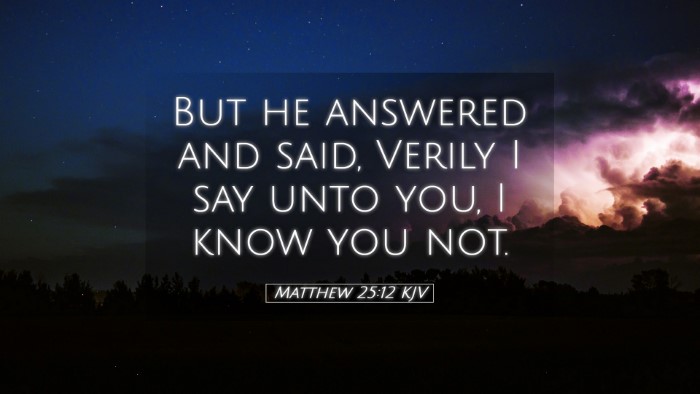Commentary on Matthew 25:12
Matthew 25:12 states: "But he answered and said, 'Verily I say unto you, I know you not.' This verse is part of the parable of the ten virgins, which illustrates important spiritual truths about preparedness and the judgment at Christ’s return.
Context and Background
This parable follows directly after the teaching of the previous verses concerning the kingdom of heaven. Here, Jesus emphasizes the necessity of being prepared for His return, using the imagery of ten virgins who took their lamps and went forth to meet the bridegroom. The two groups of virgins—wise and foolish—serve to illustrate different attitudes towards spiritual readiness.
Exegesis of Matthew 25:12
In the context of the parable, the answer provided by the bridegroom resonates with urgency and finality. It serves as a stark reminder of the consequences of spiritual negligence.
1. The Significance of "I Know You Not"
Matthew Henry emphasizes that the bridegroom's response is not merely a rejection but a profound declaration of the relationship between the true believer and Christ. The phrase indicates a separation between those who genuinely belong to the Kingdom and those who do not.
2. Characterization of the Wise and Foolish Virgins
Adam Clarke elaborates on the distinctions made between the wise and foolish virgins. The wise brought extra oil for their lamps, which symbolizes spiritual preparedness—having the Holy Spirit and the oil of grace required to sustain one’s faith. Conversely, the foolish lacked this preparedness, representing those who complacently rely on a nominal faith.
3. The Element of Time and Preparedness
Albert Barnes focuses on the concept of time—a critical element in the parable. The delay of the bridegroom symbolizes the uncertainty of Christ's return. This uncertainty necessitates a constant state of readiness among believers, as the exact timing of Christ’s return is known only to the Father.
Theological Implications
The implications of Matthew 25:12 extend to several important theological themes:
- Grace and Judgment: The contrast indicates that while grace is offered, there is a real and significant judgment for those who fail to accept it in a timely manner.
- Christ’s Sovereignty: The phrase emphasizes the absolute authority of Christ in making decisions regarding entrance into the Kingdom of Heaven.
- The Nature of Relationship: This highlights the personal relationship necessary between believers and Jesus; it is not enough to merely attend; one must know Christ and be known by Him.
Practical Applications for Today
For modern believers, this verse serves several critical applications:
- Vigilance in Faith: Christians are called to remain vigilant and engaging actively in their faith to be prepared for Christ’s return.
- Self-Examination: Believers must regularly examine their relationship with Christ to ensure that they do not fall into complacency.
- Encouraging Others: The message urges fellow believers to encourage one another to stay spiritually prepared.
Conclusion
The message of Matthew 25:12 transcends generations, echoing a call for preparedness and spiritual vigilance. The commentary from esteemed theologians emphasizes the importance of understanding this call as one that involves not merely outward appearance but a heart aligned with Christ. As the church moves forward, this parable serves as both a warning and an exhortation to live faithfully in anticipation of the bridegroom's return.


